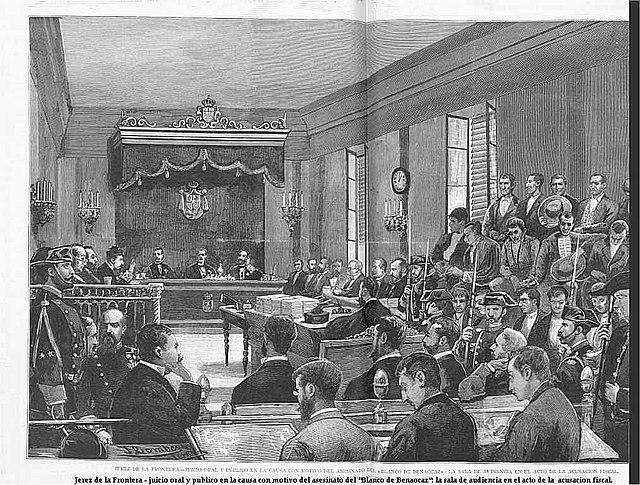Federation of Workers of the Spanish Region
The Federation of Workers of the Spanish Region was a Spanish anarchist organization founded in the Barcelona Workers' Congress of 1881 by the initiative of a group of Catalan anarcho-syndicalists headed Josep Llunas i Pujals, Rafael Farga Pellicer and Antoni Pellicer, after the dissolution of the Spanish Regional Federation of the International Workingmen's Association founded in the Barcelona Workers' Congress of 1870. It only had seven years of life since it was dissolved in 1888. Its failure, in which the episode of La Mano Negra was key, opened a new stage in the history of anarchism in Spain dominated by propaganda of the deed.
Rafael Farga Pellicer, one of the main promoters of the FTRE.
Vineyards in Jerez de la Frontera. In the FTRE, unlike its predecessor FRE-AIT, the federations that grouped Andalusian day laborers predominated.
Trial held in 1883 in Jerez de la Frontera for the murder of Blanco de Benaocaz, attributed to La Mano Negra.
Workers of a Catalan textile factory
Anarcho-syndicalism is a political philosophy and anarchist school of thought that views revolutionary industrial unionism or syndicalism as a method for workers in capitalist society to gain control of an economy and thus control influence in broader society. The goal of syndicalism is to abolish the wage system, regarding it as wage slavery. Anarcho-syndicalist theory generally focuses on the labour movement. Reflecting the anarchist philosophy from which it draws its primary inspiration, anarcho-syndicalism is centred on the idea that power corrupts and that any hierarchy that cannot be ethically justified must be dismantled.
Fernand Pelloutier, a leading figure within the Bourse du Travail movement
Christiaan Cornelissen, an early leader of the anarcho-syndicalist movement following the International Anarchist Congress of Amsterdam
Founding congress of the Confederación Nacional del Trabajo (CNT)
Demonstration by the Argentine Regional Workers' Federation (FORA) in 1915








